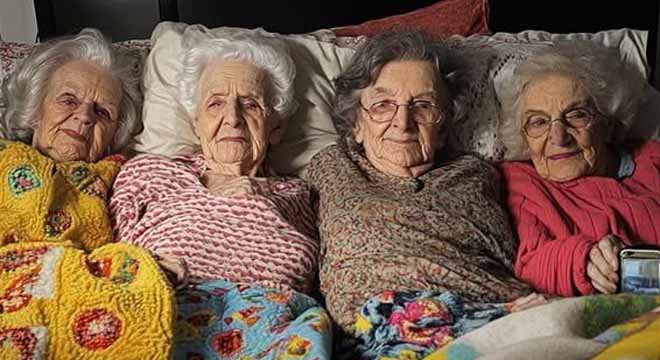“You Are Heaven-Sent, Cassandra”
“You are heaven-sent, Cassandra,” Marie, the eldest of the four sisters, once told their kindhearted neighbor. Her hands were frail, her eyes tired but warm. “Will you at least allow us to pay you for your help?”
Cassandra, then in her early forties, had been stopping by their house nearly every day for years—running errands, bringing over groceries, sitting and reading to them in the evenings, sometimes just offering quiet company when the aches of old age became too heavy.
Although Cassandra lived modestly and could certainly have used the money, she shook her head with a gentle smile. “Oh, no, Marie. I will not allow you to pay me. I do this because I care for you, not because I want anything in return. Really, don’t worry about it.”
The sisters—Marie, Lillian, June, and Ruth—were inseparable in their old age, just as they’d been in their youth. They laughed often, even as their bodies failed them, and leaned heavily on one another, until the inevitable began to happen.
One by one, they passed away, each sister leaving behind an emptier house, and a deeper silence.
When the last of the sisters, Ruth, passed, Cassandra felt like her own family had vanished. She had never married and had no children of her own. Helping the sisters had become her life’s rhythm.
A week after the funeral, Cassandra received a call from a woman named Attorney Abigail.
“There’s something I must discuss with you,” the lawyer said. “Please come to my office this Friday.”
On the same day, the children of the four sisters also began calling Attorney Abigail, expecting a will reading. Their anticipation was obvious—some of them hadn’t visited their mothers in years, but they knew there was a valuable house, antique jewelry, and some family land in the countryside.
Attorney Abigail told them there would be no group will reading—not yet.
“Each of you,” she said firmly, “will first receive a letter in the mail from your mothers.”
Three days later, the letters arrived. One by one, each adult child sat in confusion as they opened them, expecting formal statements or perhaps instructions about their inheritance.
Instead, each envelope contained the same handwritten note, signed by all four sisters:
“We want you to know that while we loved you dearly, you were not the ones by our side when we needed help most. Cassandra was. She fed us, bathed us, comforted us, and brought laughter into our last years. We don’t say this to shame you, but to honor her.
Whatever you thought we might leave you, understand this: Cassandra has earned the right to decide what to do with the estate. Everything is in her hands now. If she chooses to share, she may. If not, then let her enjoy the peace she gave us in our final days.”
Each child sat stunned. Some furious. Others quietly ashamed.
And on that Friday, Cassandra walked into Attorney Abigail’s office, unaware of what was waiting for her.
The lawyer smiled gently as she handed Cassandra a thick folder.
“All four sisters changed their wills just before Ruth passed,” she explained. “They’ve left everything—the house, the savings, the land, the jewelry—to you. And they did so with no hesitation.”
Cassandra’s eyes welled with tears. “They… they didn’t have to do that.”
“They knew,” Abigail said softly. “They knew you would’ve done it all even without a penny. But they wanted to make sure someone who truly loved them… was loved back.”
And with that, Cassandra became the unlikely heiress to a quiet fortune—not for being blood, but for being loyal, kind, and present.
And sometimes, that’s what truly counts.
